Answering the elusive: What do women (in tech) want?
A level playing field where they get recognised, have opportunities, can experiment, take risks, and have a network of allies, mentors, and supporters. That's what women in tech want.

Pakistan’s women are no strangers to being strangers. Be it literary circles or the corporate world, the country’s women have recurrently decried that they must face numerous — often insurmountable — challenges to make a name or even find a spot in their fields.
However, perhaps, few fields alienate women as much as Science, Technology, Engineering, and Mathematics — STEM.
Already established as “male territory” across the world, these fields have been some of the hardest for women to break into.
According to UNWomen: “women remain a minority in both STEM education and careers, representing only 28% of engineering graduates, 22% of artificial intelligence workers, and less than one-third of tech sector employees globally.”
A UNESCO Institute for Statistics survey taken in 2015 in Pakistan revealed that merely 15.4% of women in the country pursue engineering and technology. Of the remaining, 37% are in medical sciences, 33.8% in natural sciences, and 11% in agricultural sciences. The remaining 39.9% of female researchers opt for social sciences and humanities.
In 2019, UNWomen found that women researchers account for merely 38% of total researchers.
And while the struggle may be tough, Pakistan’s women remain undeterred, slowly but surely rising in ranks to establish a name in the tech world and also to lift others.
To get a better look at the challenges, opportunities and struggles women face in STEM, Geo.tv reaches out to Sadaffe Abid, the founder and CEO of CIRCLE — a non-profit organisation that aims to promote women’s economic empowerment through digital literacy, technology and entrepreneurship.
Q) Core challenges women face in STEM?
“Stem is a very exciting field for women, but there are many barriers and challenges. One of the barriers is that there is a lack of role models. When we don't see role models and women successful in a field, the message we get is that this is too challenging, too difficult. This is a barrier that really needs to be addressed. Then lack of exposure and the lack of skills are other challenges for women in STEM.”
Q) Is gender parity the only problem?
In terms of problems that women face while seeking employment in STEM, I think a major hurdle in our society is the mindset that discourages women to pursue careers. Women are not encouraged in their families. They lack role models in their families.
Besides, a work environment may not be as conducive [for women]. There may not be enough women, so women don't feel comfortable. They don't see other women in leadership roles.
On top of that, often policies are not necessarily women-friendly.
However, we have now great examples emerging from like Unilever, and L'Oreal, who are setting examples of bringing women to their core leadership teams and building a culture that is conducive for women because they recognize and celebrate that diversity ultimately leads to innovation. It boosts the bottom line. It builds a healthier and more productive work culture.
Q) Some major problems women face when trying to study or make a career in STEM?
Women do not necessarily promote themselves or their achievements. So, when the time for a promotion comes about, they may be not recognised and miss out on opportunities. Especially since there is an unconscious bias in the system against women. So not only do they not talk about their achievements, but they are also not as visible as they should be.
Organisatons should really look at what is happening in terms of men and women at times of promotion and see if women are also on that path of career growth that men are.
Moreover, in Pakistan, less than 2% of women are in leadership roles. It’s very challenging for women to rise up the ladder.
Thankfully, though, this is shifting. We are seeing more representation of women in organisations that are prioritizing women and want to see them on boards, and in leadership roles.
There is also a legal mandate for publicly-listed companies that at least one seat on the board has to be reserved for women to ensure that the board is diverse.
Q) How can men and society empower women to be (and excel) in tech?
Men have a very important role in this scenario. They can be very supportive and encouraging and play the role of partners in supporting women’s journey in tech and entrepreneurship — a theme very close to CIRCLE.
We advocate for men to step up and play their roles in supporting women. The role of fathers is especially critical in giving courage to women to believe in themselves, express themselves, dream, explore, and be ambitious.
Q) What is the importance of female role models in tech and how does a lack impact women?
Role models are critical in tech and in other fields. When women see other women doing well, growing and thriving. The message they receive is that it is possible. It is important to send out that signal. That’s why we need role models.
If you don’t have a lot of role models, you should showcase the stories of the existing few. You also need to bring women from marginalised communities to the forefront. These women are learning it all for the first time and using the internet and digital tools, for their own growth and family well-being.
Local stories need to be celebrated and encouraged to show that technology is empowering and can be used to solve personal challenges.
We believe that access to technology and being digitally literate are basic fundamental human rights.
Q) What do women in tech want?
CIRCLE has a huge network of women in tech from our She Loves Tech competition, which is now in its seventh year. It is a global competition for women in tech, for women startups who are using technology to solve pressing challenges.
What we believe that women in tech want, and what we have seen from the exchanges that we have had over the years with women is that they want to have a level playing field where they get recognized, they have opportunities, they can experiment, take risks, have a network of allies, mentors, and supporters. That's what they want.
It's really important to create inclusive tech systems because we need both men and women. They're unique experiences and perspectives so that we can solve some of the complex challenges that we face today in Pakistan and globally as humanity.
Q) What about imposter syndrome women in tech face? How can they get over it?
Imposter syndrome is very real. There are times when even I have asked myself, “Do I belong over here? Will I be able to do this? Is this for real?”
Women do tend to feel the imposter syndrome more than men. But I think that's why it's very important to be aware of it, to believe in yourself and to remind yourself that you are doing great things. Having a mission or a purpose that really anchors you, helps also in dealing with imposter syndrome.
But this is certainly very real. I do believe that if we want to bring more women, we have to have strategies and action steps and measurements because it's not a magic wand you’ll whisk and make it happen. We have to be seriously committed from the board level to the management.
Unfortunately, the current pace of progress is too slow.
Pakistan is ranked 145 out of 146 countries on the Global Gender Gap Index by the World Economic Forum, which means that we really are not leveraging our women’s talent and we really need to look at this differently and make it a serious priority at a policy and at a national level.
Q) How can govt and society ensure women don't eventually give up their start-ups after they begin?
Being a start-up entrepreneur is not easy. There are ups and downs, especially in today’s tough economic times. There is support required, especially from the government and stakeholders.
There should be space for experimentation and failure and these things should be encouraged by providing seed funds for experimentation to founders with spirit, resilience and attitude to take the idea forward.
Connecting such founders with mentors, incubators, experts, and organisations that help startups through their journey is also massively helpful.
Strategies to make it happen
Supporting women entrepreneurs to sustain their start-ups despite challenges requires a multi-faceted approach involving government initiatives, community support, and private-sector collaboration.
Some strategies recommended by Sadaffe that can be implemented by the government and various organizations to help women entrepreneurs thrive include:
Access to Finance: Ensure that women have equal access to financial resources and funding opportunities. This can be achieved through dedicated funds, grants, and loans specifically designed to support women-led businesses.
Mentorship and Networking: Set up mentorship programs that pair experienced entrepreneurs, both men and women, with aspiring female business owners. Creating a strong network of support can help women gain valuable insights, guidance, and connections.
Skill Development: Offer comprehensive training programs that focus on business management, financial literacy, and technical skills required to run successful ventures. Empowering women with knowledge enhances their confidence and ability to overcome challenges.
Address Socio-Economic Barriers: Governments and organizations can work towards minimizing socio-economic barriers that hinder women's entrepreneurship, such as gender-based discrimination, cultural norms, and work-life balance challenges.
Childcare Support: Provide affordable and accessible childcare facilities to alleviate the burden on women entrepreneurs, enabling them to focus on their businesses without compromising family responsibilities.
Policy Reforms: Implement policies that promote gender equality, including women-friendly labour laws and regulations that encourage a conducive business environment for female entrepreneurs.
Awareness Campaigns: Raise awareness about the importance of supporting women entrepreneurs and the benefits they bring to the economy and society. This can help challenge stereotypes and foster a more supportive ecosystem.
Incubators and Accelerators: Establish or support incubators and accelerators specifically tailored to women-led businesses. These programs can offer resources, mentorship, and networking opportunities critical for long-term success.
Access to Markets: Facilitate access to markets and supply chains for women-led businesses, ensuring fair and equal opportunities to compete and grow.
Celebrate Success Stories: Highlight success stories of women entrepreneurs who have overcome challenges to inspire others and showcase the potential of women in the business world.




